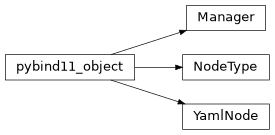Manager
This module handles the high level stuff like config options and YAML stuff. The main class is the pyMaCh3._pyMaCh3.manager.Manager class. You can read more about the manager and config files on the wiki page. YAML stuff works essentially the same as in the c++ version but with some caveats.
The main difference is that in the python version, the way that you access the actual data of a yaml node is different due to the way the python binding of the c++ code works.
Lets take the following YAML snippet as an example
Example:
Int: 1234
Str: 'TestString'
IntArray: ['0', '1', '2']
StrArray: ['val1', 'val2', 'val3']
In the c++ version you would access these by doing
// for the integer
int testInt = node['Int'].as<int>()
// for the string
std::string testStr = node['Str'].as<std::string>()
// for the integer array
... = node['IntArray'].as<std::vector<int>>()
// and for the string array
... = node['StrArray'].as<std::vector<std::string>>()
In the python version however things are different. Arrays are interpreted as arrays of YAML nodes and all of the underlying data are stored as strings. So to access the data as above you would need to do
test_int = int(node['Int'].data())
test_str = node['Str'].data()
## then for the arrays
int1 = int(node['IntArray'][0].data())
int2 = int(node['IntArray'][1].data())
int3 = int(node['IntArray'][2].data())
str1 = node['StrArray'][0].data()
str2 = node['StrArray'][1].data()
str3 = node['StrArray'][2].data()
Parsing arrays can be made a bit less painful using list comprehension
int_list = [int(i.data()) for i in node['IntArray']]
str_list = [i.data() for i in node['StrArray']]
pyMaCh3._pyMaCh3.manager Module
This is a Python binding of MaCh3s C++ based manager library.
Classes
Members: |
|
Class Inheritance Diagram
